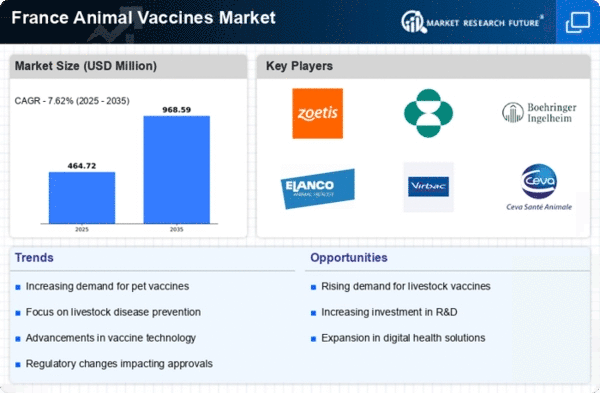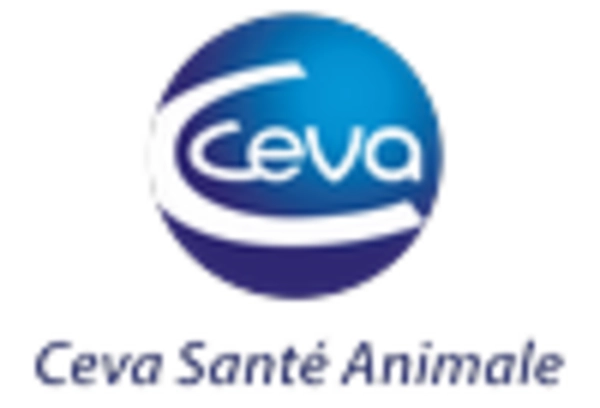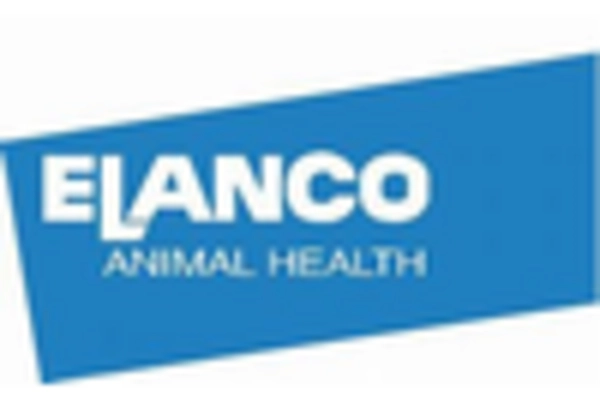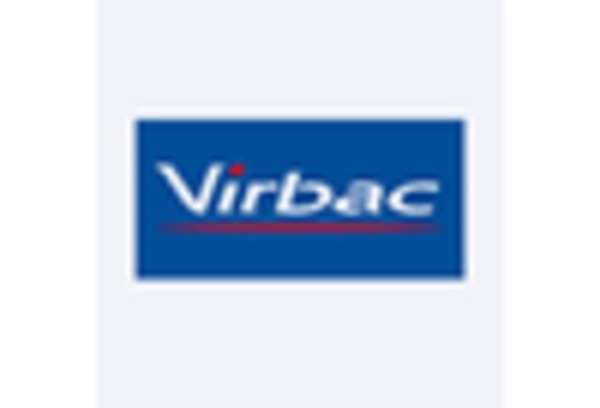Rising Pet Ownership
The increasing trend of pet ownership in France appears to be a significant driver for the animal vaccines market. As more households adopt pets, the demand for veterinary services, including vaccinations, is likely to rise. According to recent statistics, approximately 50% of French households own at least one pet, which translates to a substantial market for animal healthcare products. This growing pet population necessitates regular vaccinations to prevent diseases, thereby propelling the animal vaccines market forward. Furthermore, pet owners are becoming more aware of the importance of preventive healthcare, which may lead to increased spending on vaccines. The animal vaccines market is thus positioned to benefit from this trend, as veterinarians recommend vaccination schedules to ensure the health and longevity of pets.
Growth in Livestock Farming
The expansion of livestock farming in France is anticipated to be a key driver for the animal vaccines market. As the demand for meat, dairy, and other animal products continues to rise, farmers are likely to invest more in the health of their livestock. Vaccination plays a critical role in maintaining herd health and productivity, which is essential for meeting market demands. Reports indicate that the livestock sector contributes significantly to the French economy, with billions of euros generated annually. This economic incentive may encourage farmers to adopt comprehensive vaccination programs, thereby boosting the animal vaccines market. Ensuring the health of livestock through vaccination not only enhances productivity but also supports food safety and security.
Advancements in Vaccine Technology
Innovations in vaccine technology are transforming the landscape of the animal vaccines market. The development of more effective and safer vaccines, including recombinant and mRNA vaccines, is likely to enhance vaccination rates among animals. In France, the adoption of these advanced technologies could lead to a more robust animal healthcare system. For instance, the introduction of vaccines that require fewer doses or provide longer-lasting immunity may encourage pet owners and livestock producers to vaccinate their animals more consistently. This shift towards advanced vaccine formulations is expected to drive growth in the animal vaccines market, as stakeholders seek to improve animal health outcomes and reduce the incidence of infectious diseases.
Government Initiatives and Support
Government initiatives aimed at promoting animal health and welfare are likely to play a crucial role in the animal vaccines market. In France, various programs and policies are being implemented to encourage vaccination among livestock and pets. These initiatives may include subsidies for vaccine purchases or public awareness campaigns highlighting the importance of vaccinations. Such support from the government can stimulate demand within the animal vaccines market, as it alleviates financial burdens on pet owners and farmers. Additionally, regulatory frameworks that facilitate the approval of new vaccines can further enhance market growth, ensuring that effective vaccines are readily available to the public.
Increasing Awareness of Zoonotic Diseases
The rising awareness of zoonotic diseases, which can be transmitted from animals to humans, is likely to impact the animal vaccines market positively. In France, public health campaigns are emphasizing the importance of vaccinating pets and livestock to prevent outbreaks of diseases such as rabies and leptospirosis. This heightened awareness may lead to increased vaccination rates, as both pet owners and farmers recognize the potential health risks associated with unvaccinated animals. Consequently, the animal vaccines market could experience growth as stakeholders prioritize preventive measures to safeguard public health. The correlation between animal health and human health is becoming increasingly evident, further driving the demand for effective vaccines.
















